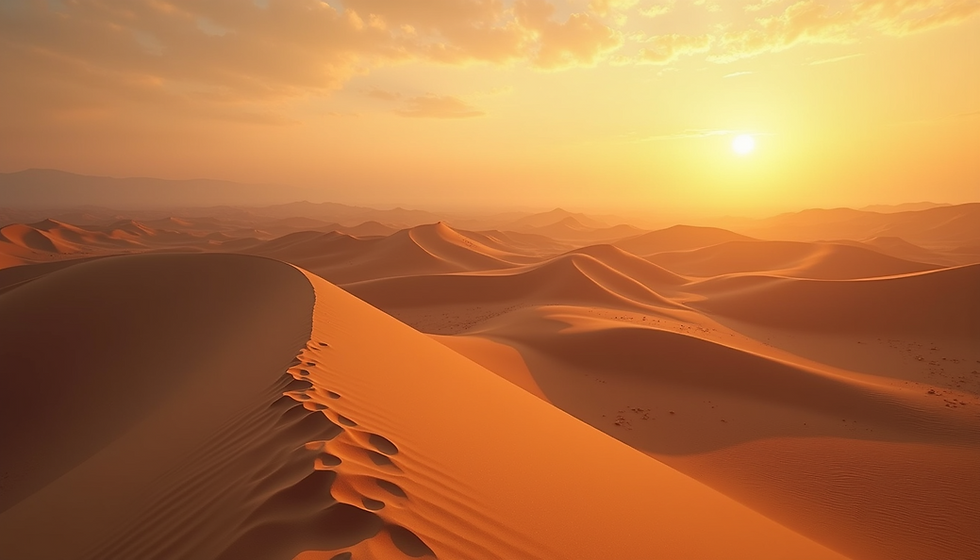Tips for Capturing Stunning Photos on Your Desert Safari Adventure
- ZSHAN DEV LTD

- Jun 21, 2025
- 3 min read
Are you ready for a breathtaking adventure in the desert? With the stunning landscapes, unique wildlife, and vibrant sunsets, a desert safari provides a perfect backdrop for photography. However, capturing the essence of this incredible environment takes some thought and skill. Follow these tips to snap amazing photos during your adventure.
Know Your Gear
Before heading out, make sure you have the right equipment. A DSLR or mirrorless camera can greatly enhance your photo quality, but even a good smartphone camera can deliver impressive results. Here is a checklist of essential items to bring:
Extra Batteries: Cold desert nights can quickly drain your battery. Consider bringing two or three charged packs.
Memory Cards: Make sure to pack at least two cards with ample storage. Running out of space while trying to capture that perfect shot can be frustrating.
Tripod: If you want to shoot during early mornings or at sunset, a tripod provides the stability needed for sharp images. This is especially useful when capturing the soft light of dawn or the warm glow of dusk.
Understand Lighting
Understanding lighting is key to great photography. The desert can present harsh conditions, but knowing how to utilize natural light can make a difference. The best times to capture stunning images are during the golden hours—early morning and late afternoon.
Early Morning: The soft, diffused light just after sunrise creates striking silhouettes of dunes and wildlife, such as camels or desert foxes.
Golden Hour: The hour before sunset bathes the landscape in a warm glow. This enhances the textures of the sand and adds drama to your photographs. Images taken during this time can often capture the true beauty of the desert.

Capture the Grandeur of the Landscape
The vastness of desert landscapes is awe-inspiring. To capture their scale effectively, consider these techniques:
Leading Lines: Use natural lines—like sand ridges or paths—that guide the viewer's eye through the photo. This technique can help convey the vastness of the landscape.
Foreground Interest: Include elements such as unique rock formations, cacti, or vibrant desert flowers in the foreground. This not only adds depth to your images but also creates a more immersive experience for the viewer.

Wildlife Photography Tips
The desert is home to unique and often elusive wildlife. Patience and keen observation are vital for successful wildlife photography. Here are a couple of helpful tips:
Long Lens: A telephoto lens allows you to photograph animals from a distance without disturbing their natural behavior. This is important when trying to capture images of shy creatures like roadrunners or jackrabbits.
Focus on Behavior: Seek to document animals in action rather than just posing. For instance, capturing a lizard basking on a rock or a hawk soaring overhead will create more engaging and dynamic images.
Composition Matters
Good composition can turn an average photo into something memorable. Consider these composition techniques:
Rule of Thirds: Imagine dividing your image with two horizontal and two vertical lines. Position key elements along these lines or their intersections for a balanced composition that captures attention.
Framing: Use natural elements like trees, formations, or even dunes to frame your subject. This technique helps isolate your subject and draws the viewer's eye directly to it.
Post-Safari Enhancements
After your adventure, enhance your images to bring out their full potential with simple post-processing edits:
Adjust Brightness and Contrast: Fine-tuning these settings can enhance details and highlight features in your photos.
Saturation Levels: Boost the rich colors of the desert landscape, like the deep oranges of the dunes and the vibrant blue of the sky. However, use restraint to avoid unnatural-looking results.
Final Thoughts
Photographing the beauty of a desert safari takes preparation, an understanding of light, and careful composition. With the right gear and techniques, you can capture stunning images that tell stories of the vibrant desert landscape and its unique wildlife. So, enjoy the breathtaking scenery, be patient, and most importantly, have fun capturing the moments that matter. Happy shooting!




Comments